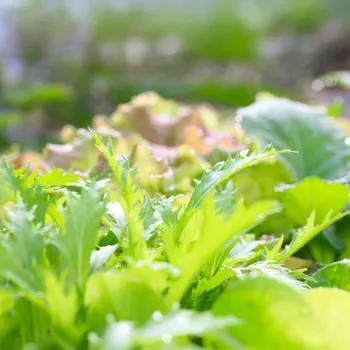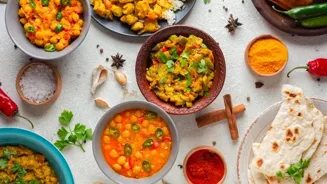Dive into India's rich vegetarian heritage, where food is intertwined with beliefs, values, and flavors. Uncover the roots and evolution of this culinary journey that transcends mere sustenance
India, a land
of diverse cultures and traditions, boasts a long and vibrant history of vegetarianism. It's not just a dietary choice here; it's deeply interwoven with religious beliefs, philosophical principles, and regional culinary practices.
For many Indians, abstaining from meat is a way of life, reflecting values of non-violence (ahimsa), compassion, and spiritual purity.
This article explores the multifaceted world of vegetarianism in India, showcasing its historical roots, regional variations, nutritional aspects, and its growing appeal in the modern era. We will see how deeply entrenched vegetarianism is in Indian society and how it continues to evolve.
Indian vegetarianism roots in ancient times from Hinduism, Jainism, Buddhism's ahimsa
The roots of Indian vegetarianism can be traced back to ancient times, with influences from Hinduism, Jainism, and Buddhism. These religions emphasize the concept of ahimsa, advocating for non-violence towards all living beings.
Jainism, in particular, takes this principle to an extreme, with followers avoiding even root vegetables in some cases, to minimize harm to organisms. Hinduism, with its reverence for cows and emphasis on purity, has also significantly shaped vegetarian traditions.
Through the ages, these beliefs have permeated Indian society, leading to a widespread acceptance and practice of vegetarianism across different communities and regions. This philosophical backbone makes Indian vegetarianism distinct and meaningful for its followers.
It provides not only dietary guidelines but also a moral compass.
Regional Indian vegetarian cuisine showcases diverse flavors, spices, and cooking styles
Different regions of India offer unique vegetarian cuisines, reflecting the local climate, available ingredients, and cultural influences. In Gujarat, you'll find dishes like dhokla, thepla, and undhiyu, often characterized by a subtle sweetness.
Rajasthan is known for its rich, flavorful curries and dals, like dal baati churma and gatte ki sabzi, which are often cooked in ghee.
South Indian cuisine features an array of rice-based dishes, lentil stews (sambhar), and vegetable curries (koottu), with generous use of spices like mustard seeds, curry leaves, and coconut.
Each region adds its own distinct touch to vegetarian fare, creating a kaleidoscope of gastronomic delights. Understanding regional variations shows the adaptability and creativity within Indian vegetarianism.
Indian vegetarian meals are nutritious and balanced with proteins, vitamins, and minerals, debunking misconceptions
Vegetarian meals in India are not only delicious but also nutritionally balanced, offering a wide range of vitamins, minerals, and proteins. Lentils, beans, and pulses are staples, providing a rich source of protein and fiber.
Dairy products like milk, yogurt, and cheese contribute to calcium and other essential nutrients. A wide variety of vegetables and fruits offer vitamins, minerals, and antioxidants. Spices, besides adding flavor, also offer health benefits.
When properly planned, an Indian vegetarian diet can meet all the body's nutritional needs, promoting health and well-being. This contrasts with the misconception that vegetarian diets lack essential nutrients.
Modern India embraces vegetarianism for health, environment, and innovation, adapting to modern values
Modern India sees vegetarianism evolving and adapting to contemporary lifestyles. While traditional reasons for vegetarianism persist, health and environmental concerns are increasingly influencing dietary choices.
Many young Indians are embracing vegetarianism, drawn to its perceived health benefits and its lower environmental impact. Vegetarian restaurants and cafes are becoming increasingly popular in urban areas, offering innovative and exciting meat-free options.
The rise of veganism, a stricter form of vegetarianism that excludes all animal products, is also gaining traction. Indian vegetarianism is no longer confined to tradition but is transforming to align with modern values and concerns.
This adaptability ensures its continued relevance in a rapidly changing world.
Vegetarianism in India: Cultural, philosophical, and culinary identity
Vegetarianism in India goes beyond just food; it's a cultural identity, a philosophical stance, and a culinary adventure.
From the ancient roots of ahimsa to the diverse regional cuisines and the modern embrace of plant-based eating, vegetarianism continues to be an integral part of the Indian experience.
Whether driven by religious conviction, health concerns, or environmental consciousness, the tradition of meatless meals in India is a testament to the country's rich cultural heritage and its enduring commitment to a sustainable and compassionate way of life.
Exploring this world unlocks a deeper understanding of India's values and its culinary treasures.
India's vegetarianism rooted in ancient ahimsa belief
India's vegetarian story starts in ancient times. Religions like Hinduism and Jainism taught kindness to all life. This idea, called ahimsa, became important. People started avoiding meat to show respect. It wasn't just a diet; it was a belief.
India's diverse vegetarian cuisines by region
Different parts of India have different vegetarian food. Gujarat likes sweet dishes. Rajasthan has rich curries with ghee. South India uses rice, lentils, and coconut. Spices add flavor and health benefits. Each region shows its style.
Indian vegetarian diet: healthy, balanced with protein, calcium, vitamins, and spices
Indian vegetarian food is healthy. Lentils give protein. Dairy gives calcium. Vegetables give vitamins. Spices are good for health. This diet is balanced. It provides everything the body needs to stay strong and healthy.

Young Indians choose vegetarianism for health and environment; veganism also rising
Young Indians choose vegetarianism for health and the environment. More veggie restaurants are opening. Veganism is also becoming popular. India tradition of not having meat is still evolving to meet present beliefs.

Vegetarianism in India: Culture, Philosophy, Compassion, Tradition
Vegetarianism is more than food in India. It's a part of the culture, a philosophy, and a cooking adventure. It’s rooted in compassion and traditions and shows a commitment to a good and lasting way of life. It reflects values we hold so dear.
India's rich vegetarian history tied to culture and religion
India is a land of diverse cultures and traditions, boasting a long and vibrant history of vegetarianism. It's not just a dietary choice; it's deeply interwoven with religious beliefs, philosophical principles, and regional culinary practices.















